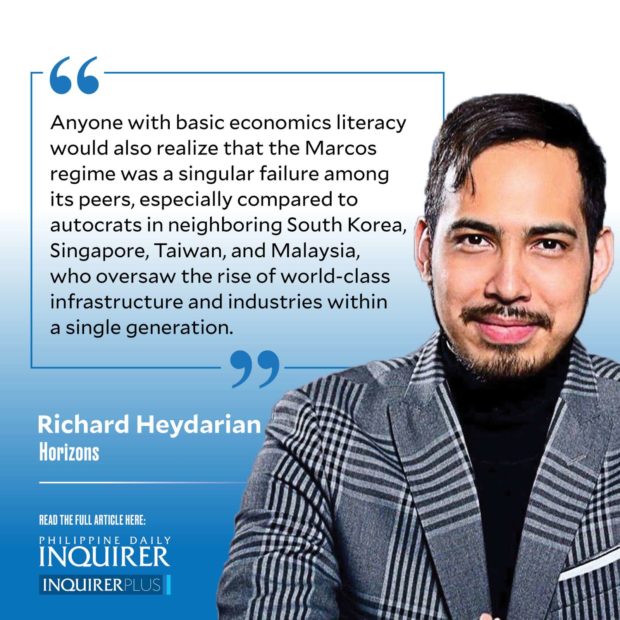On China: Marcos Jr. vs Leni
Much ink has been spilled on the devastating legacy of the Ferdinand Marcos dictatorship. No amount of TikTok videos, or Cambridge Analytica spins, can change the incontrovertible, peer-reviewed, and heavily-documented horrors of the martial law years.
Anyone with basic economics literacy would also realize that the Marcos regime was a singular failure among its peers, especially compared to autocrats in neighboring South Korea, Singapore, Taiwan, and Malaysia, who oversaw the rise of world-class infrastructure and industries within a single generation.
But when it comes to foreign policy, and our relations with superpowers, Ferdinand Marcos was neither a fool nor a craven puppet. If anything, the former Filipino strongman stood up to Cold War bullies and, accordingly, deployed proactive diplomacy to enhance the Philippines’ strategic room for maneuver.
While sticking to the Philippines’ alliance with America, Marcos deftly played Washington, Moscow, and Beijing against each other in order to create maximum room for strategic maneuver for the Philippines. Marcos also actively protected the Philippines’ interests in the West Philippine Sea, building the first modern airstrip in the Spratlys in the late 1970s to ward off rivals such as China.
Half a century later, the ex-dictator’s son is singing to a different tune, more replicating the Sinophile populist in Malacañang than Marcos’ assertive foreign policy. Ironically, it’s the liberal opposition, led by Vice President Leni Robredo, which is advocating a proactive and patriotic approach to the West Philippine Sea disputes and our overall relations with superpowers.
Having spent 21 years at the helm of the Philippine state, Marcos clearly had more opportunity to shape the country’s foreign policy than any other Filipino president. Though overseeing a hopelessly corrupt regime, and recklessly embroiling the Philippine military in a decades-long domestic insurgency, Marcos was relatively successful in foreign policy.
First of all, he embraced what political scientists call “subaltern realism,” which pertains to the efforts of post-colonial states to, despite their limited power, advance their national interest beyond the dictates of superpowers. According to historian Archie Resos, it was Marcos who tried to end the Philippines’ “neo-colonial” status by going “beyond traditional diplomacy that was solely characterized by diplomatic dependence on the United States” in favor of a proactive foreign policy, which “vigorously pursued Asian regionalism and diplomatic relations with Third World countries, Middle Eastern countries, and Socialist nations—all in pursuit of the country’s national interest.”
Instead of just appeasing superpowers, including the Americans, he proactively built communications channels with all competing sides. Interestingly, Marcos even relied on secret channels established by remnants of the Partido Komunista ng Pilipinas (PKP) to explore fruitful relations Moscow.
As historian Joseph Scalice explains, “these secret channels, were meant to provide leverage for renegotiating the unequal economic terms of the Bell Trade Act and the Laurel-Langley Agreement with Washington.” Not long after, Marcos also became among the first US allies to establish formal diplomatic ties with Maoist China. Marcos was wise enough to realize the value of the Philippines’ alliance with the US, so he deployed a dynamic equilateral balancing strategy to negotiate better terms with Americans.
But Marcos’ signature foreign policy is arguably in the West Philippine Sea, where he fortified the country’s strategic position by building military and civilian facilities in the contested areas. In fact, the Philippines was so proactive in protecting and expanding its interests in the South China Sea that then US Secretary of State Henry Kissinger feared that Washington could get dragged into a Marcos-driven dispute in the area.
Now contrast this to Ferdinand Marcos Jr.’s foreign policy position, which largely echoes President Duterte’s Beijing-friendly foreign policy. In one interview after the other, the former senator has sounded more fatalistic than assertive on the South China Sea disputes, routinely insisting that “diplomacy” alone would be sufficient, contrary to all available evidence.
Interestingly, it’s actually opposition candidates such as Robredo who have been emphasizing the need for a proactive foreign policy, which resists superpower bullies, strengthens our position in the West Philippine Sea, and maximizes our wide network of alliances and strategic partnerships. After all, authoritative surveys show that a super-majority of Filipinos want the government to resist Chinese expansionism, uphold our national dignity, and protect our sovereign rights in the West Philippine Sea.





















